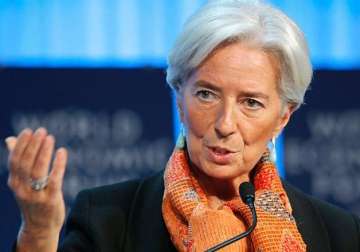Washington: Bullish on India, IMF chief Christine Lagarde has said she is hopeful that the Indian government would be able to implement a series of "critically important" economic reforms including GST for unleashing the country's growth potential.
"The IMF is quite bullish about India, and our forecast for 2016, 2017 is 7.5 per cent growth," Lagarde said in response to a question at the University of Maryland yesterday.
"So we see India as benefitting, actually it's one of the major beneficiaries of the lower oil prices. When you look at the scale of benefits for particularly the emerging countries, India comes out, you know, way ahead," the IMF Managing Director said.
"IMF also believe that the monetary policy, the taming of inflation is also going to benefit the very large domestic market of India," she said, noting that consumption is also going to be one of the key drivers.
"All of that of course, with the hope and the provision, if I may say, that the trend of reforms identified by Prime Minister Narendra Modi, can actually proceed, whether it's in the fiscal area, by way of implementing the Goods and Services Tax, significant reform like the land reform that is considered," Lagarde said.
She said those reforms are actually going to be "critically important" for the unleashing of growth potential that India has to offer.
"One additional component which we regard as important, and that would be the investment in infrastructure that is so badly needed in many countries, but in India in particular, where there are bottlenecks, both in terms of physical infrastructure, as well as, I would say, administrative infrastructure, and those are key policies to implement," she said.
GST, which will subsume all indirect taxes such as excise duty, service tax and sales tax into one uniform rate, is stalled in the Rajya Sabha as Congress is pressing for three changes.
The Congress has stalled the passage of the constitutional amendment Bill, derailing the government's plan to roll out GST from April 1, 2016.
The three demands are a cap on the GST rate in the Constitution itself, removal of the proposed 1 per cent additional tax on inter-state movement of goods and setting up a judicial panel to adjudicate disputes among states.
Latest Business News
